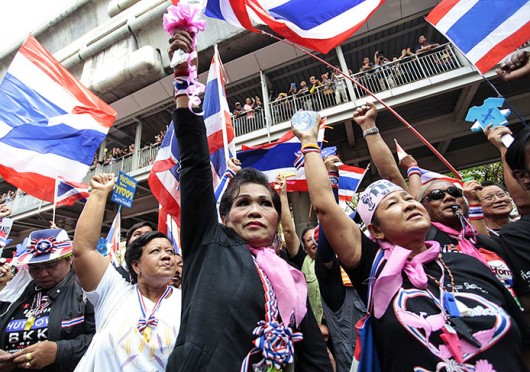Some Ohio State students from Venezuela and Thailand are concerned about ongoing protests and violence in their countries.
Protests in Venezuela started earlier this month as students demanded increased security after a female student reported an attempted rape. Other opposition groups joined in the protests, which are demanding a variety of things, including the release of people arrested during previous marches, increased security and increased freedom of information.
At least 13 people have died because of the protests.
Antonio Armas, a fourth-year in economics and mathematics from Venezuela, said he attended a gathering Saturday in downtown Columbus to protest the violence in his country.
“There were 50 to 60 people there,” Armas said. “People (were) there showing their signs, singing some protest songs. They were just peacefully (speaking) out (about) what is going on.”
Armas said the protests in Venezuela were essentially caused by the corruption of the government along with social and economic problems.
“There are a lot of college students (protesting) these issues,” Armas said. “These students are from public universities, private universities. They are from all types of social classes.”
Protests are currently upsetting Thailand as well.
In November, Thailand’s government did not pass an amnesty bill that would have allowed former leader Thaksin Shinawatra to return to the country without penalty, though Shinawatra was overthrown in a military coup in 2006 and was convicted of corruption. People continued protesting after the bill’s defeat, though, with mostly urban and middle-class voters calling for a reformed political system that would emphasize an unbiased democracy.
Pavinee Suttiviriya, an OSU graduate student in plant pathology from Thailand, said there have been rumblings for years, but the protests only recently started in full force.
“It did not become big until last November when the prime minister was trying to pass the amnesty bill,” Suttiviriya said.
Both Armas and Suttiviriya said many of their friends have been participating in the protests in their respective countries.
“I have some friends … protesting on streets and they sent me pictures of people (who were) attacked by rubber bullets,” Armas said. “In the past week, I’ve been (concerned) about the safety of many of my friends who attended the protests and also the safety of my family members.”
Suttiviriya said she, too, knows people protesting.
“My friends and some of my previous professors (in Thailand) are involved,” Suttiviriya, who attended undergraduate school in Thailand, said. “They want (Prime Minister) Yingluck (Shinawatra) to return the power.”
Shinawatra has been accused of running a corrupt government and is under pressure to step down.
Varittha Sanphuang, a graduate student in electrical and computer engineering from Thailand, said she is worried about her family living in Bangkok.
“My mom attends (the) protest sometimes and all my three sisters go there almost every day,” Sanphuang said.
Armas said he hopes other students at OSU make an effort to understand what’s happening in his home country.
“(Students in Venezuela) are just very (concerned) about the future of the country,” Armas said. “They do not (want) to harm anybody.”
Suttiviriya said she has been praying for her country to “pass this hard time.”
“Even though there are some conflicts, we still love each other,” Suttiviriya said. “It’s just we have different thoughts. So I think if we pass this situation, our country is gonna be the same.”
Sanphuang agreed.
“We can think differently, but we are all still Thai,” Sanphuang said. “I hope this protest (will) end soon.”



